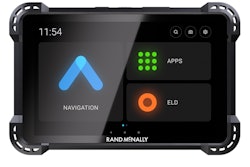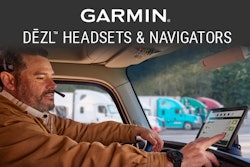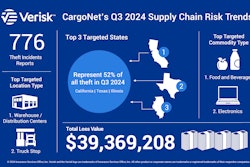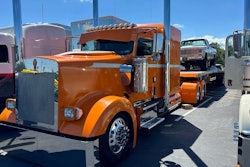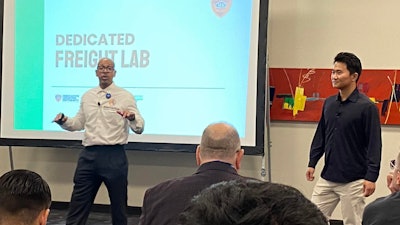
With freight rates in dismal territory and brokers becoming ever more restrictive and frankly a little crazy in their carrier selection criteria, times have hardly ever been tougher for owner-operators hoping to make a living in spot freight markets.
The obvious solution for carriers is landing direct freight with awesome, high-volume shippers in your immediate area, but that's easier said than done, right?
At the Broker-Carrier Summit in Fort Worth, Texas, on Monday, trucking coach Adam Wingfield put on a clinic on how to approach, impress, and seal the deal with shippers. Brokers land direct freight all the time, don't they? As any carrier knows, sometimes that broker successfully lands a big shipper without knowing the first thing about the kind of trucking service the shipper requires. How they do it comes down to confidence, managed perceptions, and a series of little white lies the business world collectively refers to as sales.
"Who in here that’s a carrier believes that in the bottom of your heart, you can put the load board down and go out and secure direct freight?" asked Wingfield near the opening of the session.
A few hands went up.
Then: "Who in here believes you have one truck so you can't go out there and secure direct freight?" A few more hands rose.
Wingfield doesn't mince words. Carriers will have to "embrace the word no" in their sales efforts, he said. A shipper might say to a carrier "we already use someone else," or "we use TQL," or "we need a carrier with 500 trucks." Or they might just be too busy to talk to you, he said.
But the hard truth, according to Wingfield, is that being defeated is a choice. "You're just not working hard enough" if those no answers end the conversation, he said.
Instead, he offered instructions on how to play the same game that brokers play to advantage with shippers.
How to beat brokers at their own game
First focus on "carrier makeup," or "what makes you different than Schnieder, what makes you different than someone else," as Wingfield put it.
Justin Lu, founder of Truckpedia and Wingfield's cohost for the Direct Freight Lab session at BCS, broke in with the story of his father's trucking career. Lu's father worked hard to cement his business pulling a dry van, and when it came time to buy another truck and trailer, he thought he'd branch out and get into reefer. Next time at the dealership, he figured he'd try flatbed.
"In his definition, he's diversifying their risk, putting eggs in different baskets," said Lu.
That's when the Lu family stopped having "fun" in trucking, he said.
"If you're known for everything, you're known for nothing," he continued. Instead of becoming a player in all three major equipment types, he had simply opened three cans of worms. "There was not enough resources, budget or time to go out after any" one equipment type, and similarly, they were running 48 states.
[Related: 'Stop dealing with brokers who treat you like garbage']
The Lus turned their situation around by implementing an organizational chart, defining clearly each family member's role in the business and focusing on a a hyper-specific niche -- medical equipment. Justin directed his family to attend medical equipment conferences and found they were the only carriers in the building. Using that face time with the shippers, he approached them directly, speaking with some knowledge about their "pain points" and positioning himself not as a carrier, but an "expert consultant" in medical equipment logistics.
Maybe that was Lu's white lie, his sales pitch, but it worked, and within a few hauls in the medical equipment niche, the Lu family in fact were experts in the field.
"If you haul something a couple times, you pretty much specialize it," said Wingfield.
There's a phenomenon in the business world called "imposter syndrome," where qualified, smart, hardworking people often see the bold confidence of other, less-hardworking people and assume there's something wrong with themselves. Do your best to dispel yourself of that notion. Between a truck driver and a broker both trying to sell "capacity," after all, who is the real imposter?
End negative self talk, Wingfield stressed. "Don't use the word small," he said. Call your business or fleet "compact," or better yet "boutique." Do you know what a boutique store is? It's a small store with snazzy sales lingo.
"When I started with Schneider I was moving glass on those teepees with the 204-inch" panels, said Wingfield. "It was very, very dangerous. They stacked six on the left and five on the right" to balance the trailer against the pitch of the highway. Wingfield recalled fighting the wobble of the truck, and being extra careful not to strap the glass too tight and break it.
"If I'm talking to a shipper about glass, they'll say 'he knows what he's talking about,'" said Wingfield.
Think of the types of freight you might "specialize" in, and build a carrier packet around that. The carrier packet, by the way, should be wall-to-wall sales copy with a slick finish and laser-focused on landing not just whoever, but your ideal shipper.
"Ask a carrier what are you good at hauling and they might say 'dry van' or 'freight of all kinds,'" said Lu. "But if you search that on Google, it's not going to populate any results."
Keep in mind that shipping managers, CEOs, and whatever other white collar workers you're trying to court in sales basically live on Google. If you can shape the results that populate on their computer screen, you essentially shape their reality.
An ideal carrier packet features a first-page "table of contents. The second page is [certificates of insurance] the third is services, the fourth page is expertise, then motor carrier certifications," said Wingfield. It ends with a page showing contact information and a "call to action."
Wingfield stressed carriers should go get a WBE certification (a woman-owned business, if that applies), or an EPA Smartway certification. These extra steps don't take much effort, and now in your carrier packet you can brag about how efficient and eco-friendly you are. Does the shipping manager you're trying to reach drive a Prius? Try wedging in that Smartway line.
Also, Wingfield challenged carriers to step their game up. "Don't use ChatGPT and stock images," he said. "Show your real stuff, stand beside the truck. Stick your chest out."
How to write impactful openers without AI help? Wingfield gave some examples.
“Proudly serving the automative, agricultural and retail sectors," he said, for example. “Though compact [not small], our carefully curated fleet of five top-tier trucks is fully equipped to meet your needs....“
Maybe these sentences sound like exaggerations, or downright ridiculous, to you, but it's the kind of sales talk that brokers use to land lucrative contracts, which they then take about 15% out of and ask you to move.
Once you've got a carrier packet that details "what makes you special," Wingfield added, it's time to fully bring the sales pitch home with a Google Business profile and some good reviews. Once a shipper's interest is piqued with an impressive carrier packet, their next natural step is to Google you; having a completed profile there might just seal the deal. Talk to brokers and shippers who have worked with you, and ask them to leave a positive review on your profile.
Make sure you can answer the ages-old why question, too. Wingfield challenged carriers to come up with five specific reasons a shipper should choose them. One carrier said, "You can call me anytime."
"I can call anyone anytime," said Wingfield. Instead, focus on specific tracking technologies and tech, the specific skills you use in your work.
[Related: 'Sweetness of low price' v. the 'sour of bad service': Trucking in the freight trough]
Finally, Wingfield pulled up to the front of the seminar a cart with two chairs on it and asked carriers to come up with a sales pitch to land the load.
One bold carrier approached with a mastery of the sales talk Wingfield had been advocating for.
"We specialize in double chair hauling, we're EPA and Smartway certified, and we just we pulled about three or four of these for your neighbor last week," said the carrier.
Find more insight on landing direct freight in the Chapter 18 "Going independent' chapter of ATBS and Overdrive's coproduction of the annually updated "Partners in Business" book for new and established owner-operators, a comprehensive guide to running a small trucking business sponsored for 2024 by the Rush Truck Centers dealer network. Follow this link to download the most recent edition of Partners in Business free of charge.

